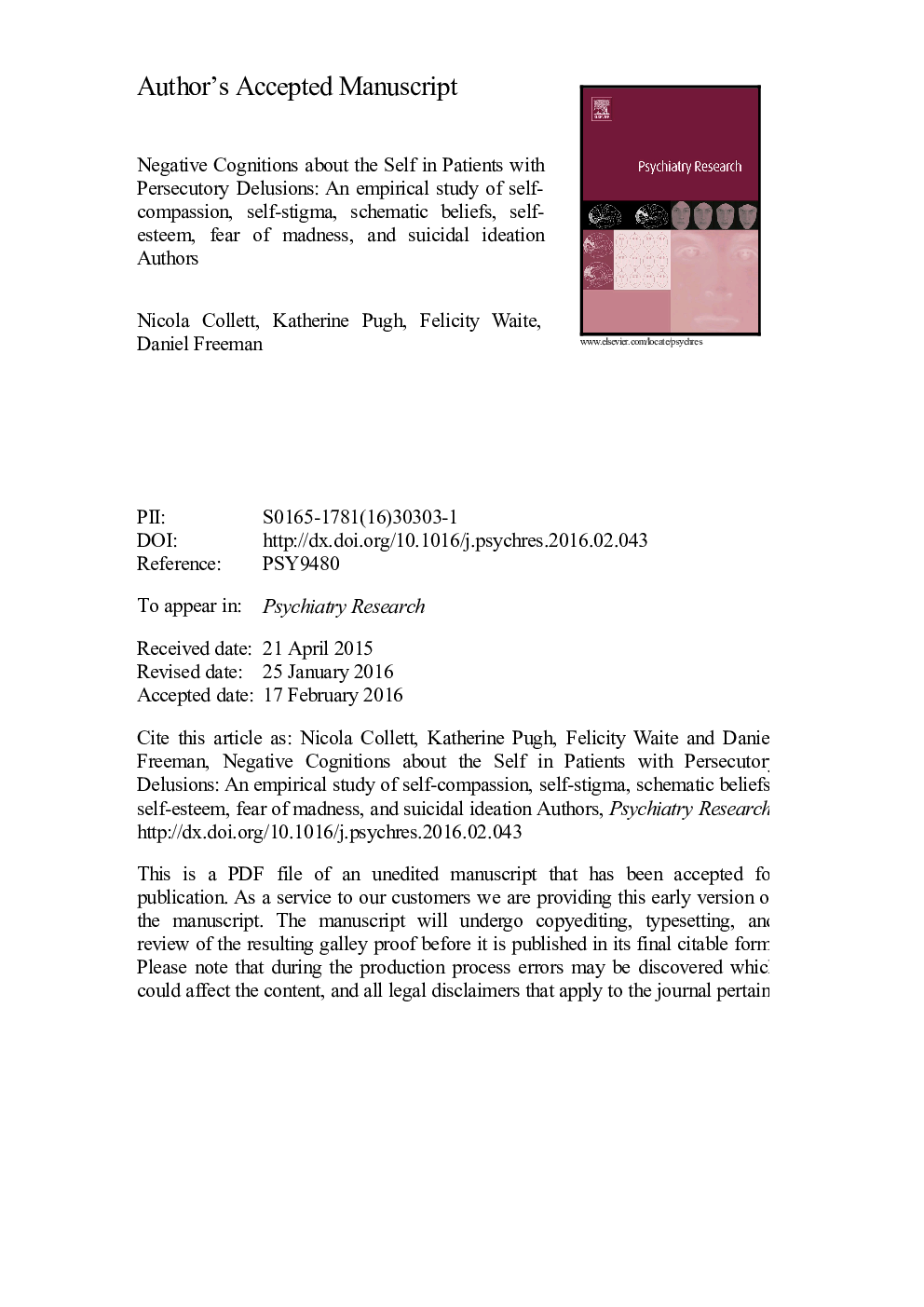| کد مقاله | کد نشریه | سال انتشار | مقاله انگلیسی | نسخه تمام متن |
|---|---|---|---|---|
| 6813343 | 545863 | 2016 | 16 صفحه PDF | دانلود رایگان |
عنوان انگلیسی مقاله ISI
Negative cognitions about the self in patients with persecutory delusions: An empirical study of self-compassion, self-stigma, schematic beliefs, self-esteem, fear of madness, and suicidal ideation
ترجمه فارسی عنوان
تشخیصهای منفی درباره خود در بیماران مبتلا به اذیت و آزار و اذیت: یک مطالعه تجربی خودکفایی، خودمحور، اعتقادات اساسی، اعتماد به نفس، ترس از جنون و عقاید خودکشی
دانلود مقاله + سفارش ترجمه
دانلود مقاله ISI انگلیسی
رایگان برای ایرانیان
کلمات کلیدی
روانپریشی جنون جوانی، افکار خودکشی، خودپنداره منفی، خودخواهی، اعتماد به نفس،
ترجمه چکیده
آگاهی رو به رشد در مورد شیوع بالای افسردگی های منفی در مورد خود در بیماران مبتلا به اذیت و آزار و اذیت ها وجود دارد و پیشنهاد شده است که ترس های پارانویا بر این آسیب پذیری های درک شده تأثیر می گذارد. این مطالعه با هدف بررسی اولویت های مختلف مفهوم گرایی خود منفی و بررسی ارتباط با اظهارات خودکشی در بیماران مبتلا به بدبینی های آزارنده انجام شد. بیست و یک بیمار مبتلا به اذیت و آزار و اذیت و 21 فرد غیر بالینی اقدامات مربوط به خودآزاری منفی را تکمیل کردند. گروه توهین آمیز نیز اقدامات خودکشی را تکمیل کرد. مشخص شد که بیماران مبتلا به اذیت و آزار و اذیت، خودکفایی کم، عزت نفس پایین، افزایش ترس از دیوانگی، اعتقاد به ناتوانی نسبت به دیگران، خودمراقبتی منفی و خودمختاری کم مثبت در مقایسه با غیر بالینی گروه کنترل. اندازه اثر (کوهن د) بزرگ بود، و مفهوم سازی های مختلف از خودمختاری منفی به شدت با یکدیگر مرتبط بود. خودمختلف بین دو گروه تفاوت نداشت. علاوه بر این، افکار خودکشی به شدت با خودکفایی پایین، اعتماد به نفس پایین، ترس از جنون و خودمحور منفی، اما خود منحرف نیست. این مطالعه نشان می دهد نشانه های منفی خودمندی در بیماران مبتلا به بدبختی آزارنده است. این به احتمال زیاد اهداف مداخلات بالینی را ثابت می کند، زیرا ترجیحات بیمار به احتمال زیاد تعیین بهترین مفهوم سازی خواسته های منفی برای پزشکان برای استفاده است.
موضوعات مرتبط
علوم زیستی و بیوفناوری
علم عصب شناسی
روانپزشکی بیولوژیکی
چکیده انگلیسی
There has been growing awareness of the high prevalence of negative cognitions about the self in patients with persecutory delusions, and it has been proposed that paranoid fears build upon these perceived vulnerabilities. This study aimed to investigate for the first time a wide range of different conceptualisations of the negative self, and to examine associations with suicidal ideation, in patients with persecutory delusions. Twenty-one patients with persecutory delusions and twenty-one non-clinical individuals completed measures relating to negative self cognitions. The delusions group also completed a measure of suicidal ideation. It was found that the patients with persecutory delusions had low self-compassion, low self-esteem, increased fears of being mad, beliefs of inferiority to others, negative self-schemas, and low positive self-schemas when compared to the non-clinical control group. The effect sizes (Cohen's d) were large, and the different conceptualisations of negative self cognitions were highly associated with one another. Self-stigma did not differ between the two groups. Furthermore, suicidal ideation was highly associated with low self-compassion, low self-esteem, fears of madness, and negative self-schema but not self-stigma. This study shows marked negative self cognitions in patients with persecutory delusions. These are likely to prove targets of clinical interventions, with patient preference most likely determining the best conceptualisation of negative self cognitions for clinicians to use.
ناشر
Database: Elsevier - ScienceDirect (ساینس دایرکت)
Journal: Psychiatry Research - Volume 239, 30 May 2016, Pages 79-84
Journal: Psychiatry Research - Volume 239, 30 May 2016, Pages 79-84
نویسندگان
Nicola Collett, Katherine Pugh, Felicity Waite, Daniel Freeman,
